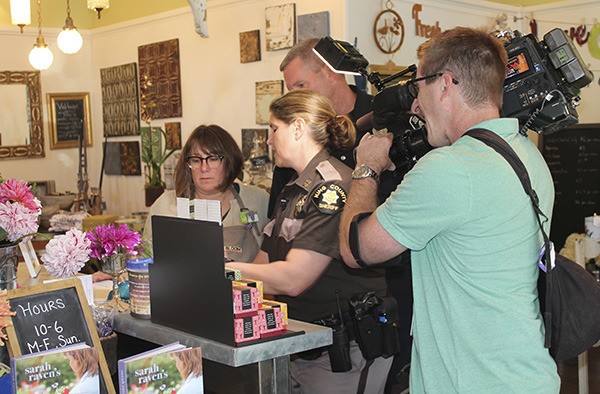Seven island businesses signed up last week for the Safe Place program designed to reduce LGBTQ hate crimes and increase reporting of them, and several more are expected to sign on soon, according to Seattle police officer Jim Ritter.
Ritter, who developed the program this spring, and King County Sheriff’s Office Captain Michelle Bennett were on Vashon last week to launch the program. While here, they met with several business people as well as students from the Queer Straight Alliance (QSA) at the Vashon High School. That night they hosted a community meeting, which Ritter said about 10 people attended.
“I am thrilled. I did not know what to expect exactly,” Ritter said. “I think as more businesses sign on and talk about it, we will be getting more people to sign up.”
The duo was accompanied by Knight Sor, a representative from the U.S. Department of Justice, and was trailed by King 5 news.
Sor said he came along to observe Ritter and Bennett and learn more about how the program works.
“When an assessment is made, I’m going to be sharing this with other communities that need this,” he said. “We’ll share this as a best practice other police jurisdictions can adopt.”
As part of the program, businesses and other groups place a rainbow decal in a window and agree to harbor any person from the lesbian, gay, bisexual, transgender and queer/questioning community who feels threatened and call 911. Originally created for Seattle, the program is spreading to several communities across the county and as far away as Canada. Vashon will serve as a pilot program for the King County Sheriff’s Office, which is in the initial stage of launching it with support from the Seattle Police Department.
Lisa MacLeod, the co-chair of VARSA (the Vashon Alliance to Reduce Substance Abuse) attended the meeting at the school, which she said about five students attended.
MacLeod said Ritter spoke with them about the initiative and how their support of the program will be appreciated, as this is the first time the program has been started outside of a major city.
The next step at the schools, where the program’s focus will be on zero tolerance for any kind of bullying, MacLeod said, is to get Superintendent Michael Soltman to sign on with the support of the QSA. She noted the program’s importance there.
“Even though we are an accepting society and a school, there is still an undercurrent of verbal abuse that goes on,” she said.
MacLeod will continue to spread the initiative to island businesses that have not signed on, she said, as part of VARSA’s mandate is to make Vashon a safer place. She noted the program has funding for suicide prevention and mental health support, and she believes the Safe Place program fits well with that.
Businesses can also sign up online at seattle.gov/spd-safe-place, she said.
This Safe Place is not to be confused with another Safe Place program that already exists on the island, which the Vashon Library, Metro buses and Vashon Youth & Family Services participate in. That program connects youth in crisis to help, and businesses and agencies can participate in each.
“Both programs can work hand-in-hand together,” Ritter said.



